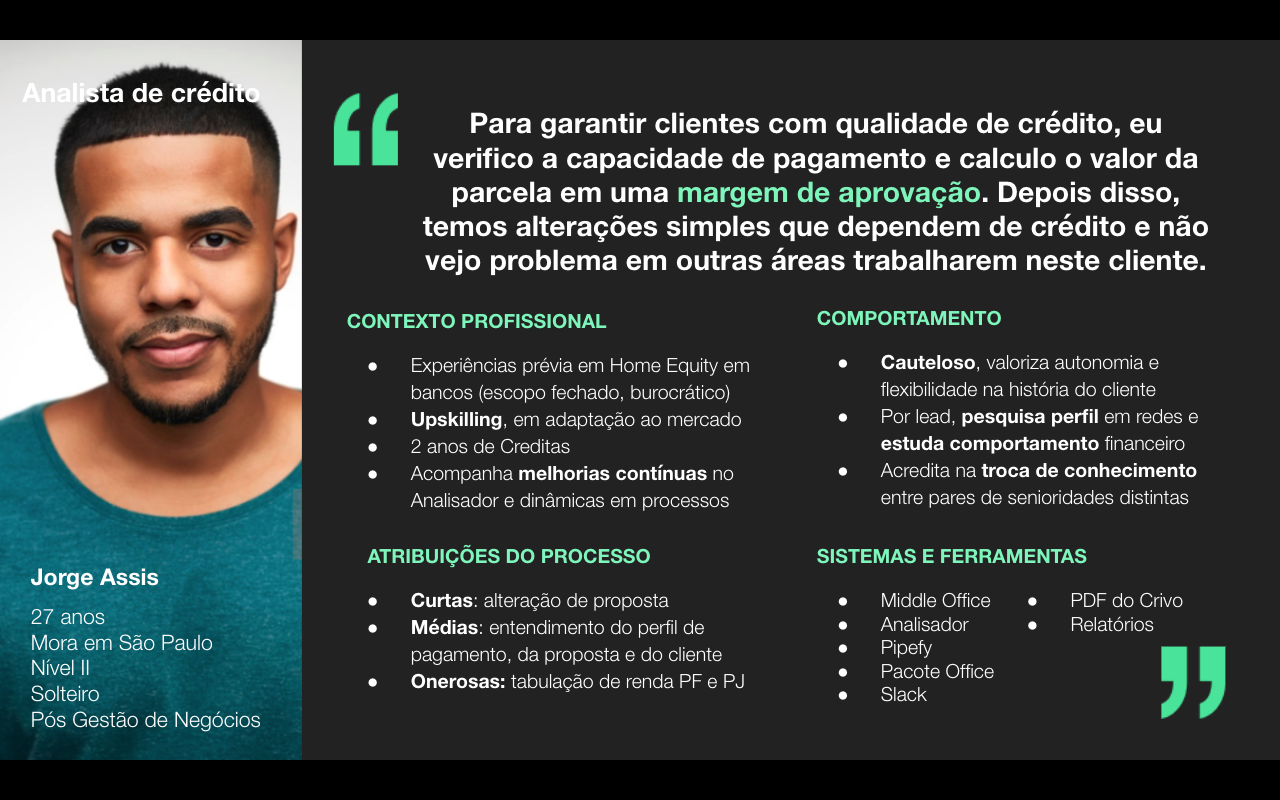Use case: Open banking accounting
Humanizing credit for customer segmentation in a credit engine agnostic solution for a home equity ecosystem
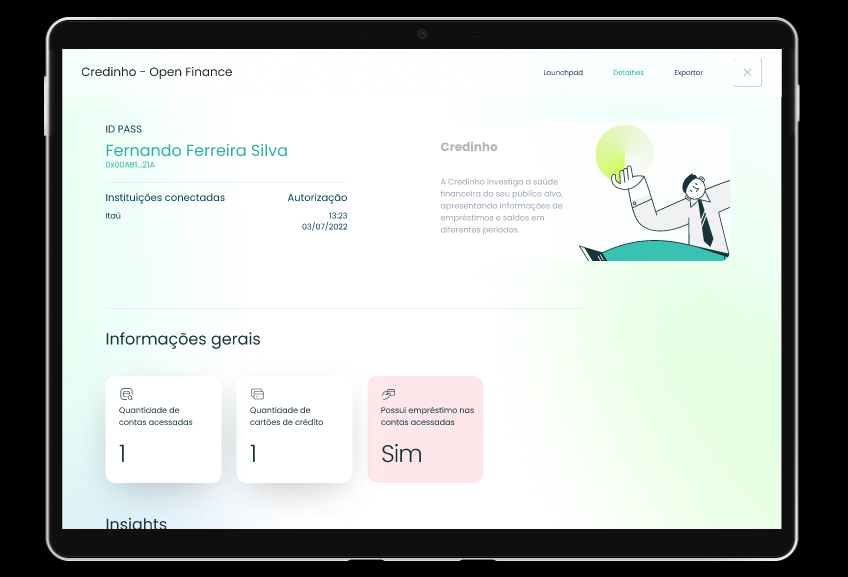
Context
The humanization of credit processes proved to be the safest way to measure the trust and credibility of customers in financial institutions, with a view to responding to Open Finance integration opportunities.
With this principle in mind, we worked on a digital transformation case study for the credit analysis area, where the main business problem was oriented towards the hypothesis of unifying the moment of communication of the sales executive, as an internal customer, by improving the self-service experience of the user of digital channels (end customer).
Problem
Instead of receiving several PDF files of bank statements, we seek to offer an internal and low-cost experience for the customer by qualifying the moment of contact with the final customer. The digital account integration solution aimed to minimize the need for manual income documents by offering account connection via open-banking in cycles of web scraping experiments.
In other words, we eliminate some issues involving business income offenders when we raise awareness of the verticals:
minimizing "income proof" properly as a major pain point for the customer;
the verification of unstable income information as operational (and manual) pain (from the credit analysis team and the commercial);
wear with communication in the customer experience (commercial and CRM);
mediation between "Trust vs. Risk" by the Corporate Business Intelligence areas.
Assumption: Sending multiple PDF files offers low end and internal customer experience
Hypothesis: Unify the moment of communication with the client to request income documents, offering connection to accounts via open-banking scraping
Solution
Optimized income tabulation, to be integrated via API, provided to the credit team in order to facilitate contact with the customer when obtaining the necessary documents for income tabulation.
Results
With this project, it was possible to:
Reduce origination CAC and increase the level of automation of the conveyor reflected in the E2E customer experience
Potentially offer a 49.9% reduction in the time from application to credit approval (with credit desk analysts)
150+ Pre-built credit statements for building predictive credit models (with data science engineers);
25% increase in risk score approval and termination rates (with portfolio team); 200 accounts connected in 2 weeks of experimentation (with the product, design and technology teams);
Insights
New customer segments as promoters of Open Banking
PF showed more confidence than PJ
Digital ageism against all odds and unlike stereotypes
Learning
Data Driven sampling with the commercial, Business Process and Product Hacking team
Experiments to understand customer perception for certain financial behavior profiles
Quali and Quanti triangulated data patterns helped to identify and promote correlations to new commercial segments in the context of real estate lending.
Friction:
In the first two occurrences of the experiment, there was no public engagement and with the data obtained it was not possible to contribute and support evidence or conclusions. The high level of uncertainty was positively influenced by this bias, as we knew how much we didn't know about something. However, we promote cycles of experimentation with potential learning.
Action:
To convert this, we started exploratory experiments (Wizard of Oz) to reduce harmful uncertainties and identify the true potential to be worked on (building a roadmap for the future Open Finance integration). With the experiment, it was possible to readjust the target audience - starting with individual clients, we found more opportunities for corporate clients given the representativeness of the executed data - influencing a high flow of interactions during the test cycle because the possible impact generated by the high volume of PJ customers being captured in the experiment. As a result, it was possible to have an even greater reach of market share for the B2B2C audience, in addition to important new skills for the technology team to develop, considering batch executions.
Lessons learned:
The open finance validation use cases needed to be tested with the 60+ public, which represented the largest volume of customers in this business unit, but also a new customer segment as a promoter of Open Banking. Thus, in 3 months we evidenced key opportunities in our partners' ecosystem with data that represented the familiarity and interest in the studied technology, in addition to demonstrating greater confidence in the brand by the user/customer.
Fully responsive
Modify website to fit various sizes of devices and enhance their responsiveness.
Pre-built layouts
Jumpstart your project with pre-built layouts such as headers, footers, and more.
Work with real content
Take advantage of CMS collections and integrate them with any design layout.
Outcomes
Prebuilt credit statements
for building the credit model
reduction in time from application to credit approval
increase in pass rates
and risk score termination
Conected accounts
in 2 weeks of experiment
Stakeholders mapping
The project focuses on the digital experience and innovation in credit using Design approaches in collaboration with partner teams from Product Hacking, Commercial, Marketing, ProdTech, Business Process, Credit Risk, Credit Platform Teams and others.
The contribution of Design time is oriented to the rearrangement of the area's processes, in the demands of each of the Content Design, Product Design and Service Design specialties.
Main responsabilities
As a service designer my main responsabilities was:
1. Organization and monitoring of Design demands
2. Shared governance with the responsible teams
a. Monitoring the backlog and progress of the project
b. Follow-up internal journals and synchronized with the supplier
3. Integration of UX project strategies in the credit area
1.Identify gaps and integrate issues that contribute to the experience
A. Articulation and stakeholders management;
B. Follow-up process management and design prototypes to test implementation;
C. Co-creation of diagnostic report and design presentation for partners;
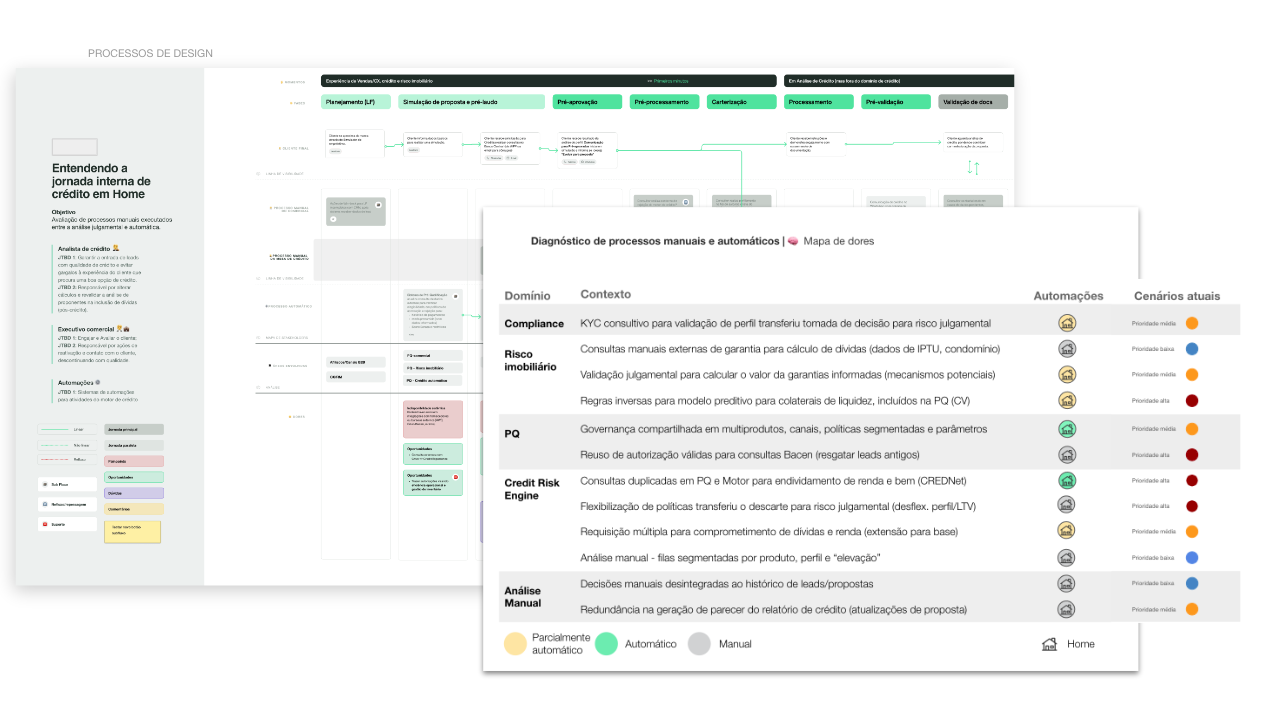
Engine vs Manual E2E diagnosis
Add animation to your designs to give them a more captivating look.
2. Explore different methodological approaches to resource and constraint analysis
A. Formulating criteria and specifications to aid estimation by the product team;
B. Support with tools for defining and validating hypotheses (in a simple and effective process that can guarantee the potential idea and its learning cycle);
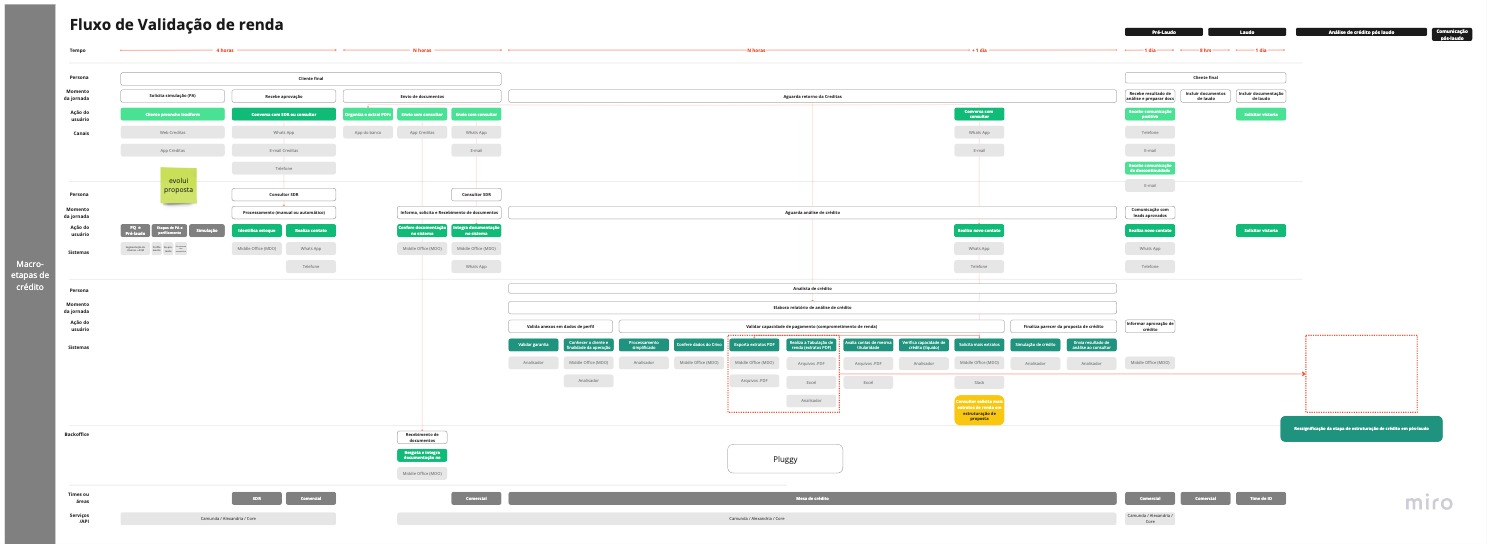
Internal User Journey issues
Establish consistent styles for elements throughout your project.
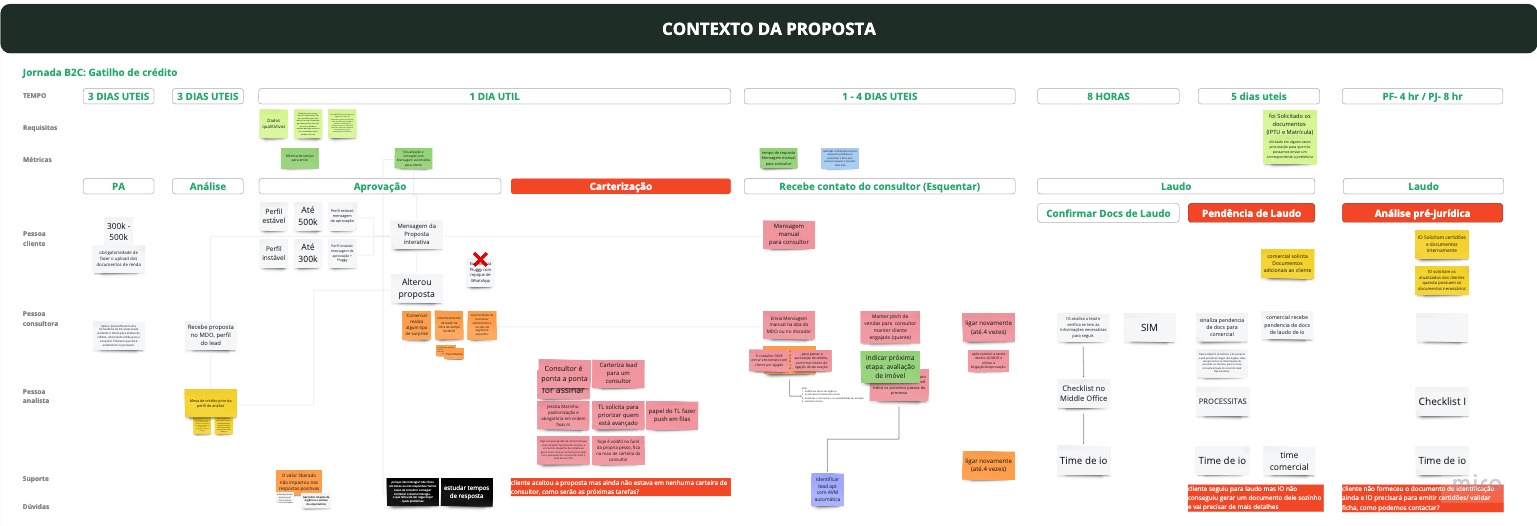
Business Process gaps
Save group of elements as components and reuse them.

Design audit previous LP Xp
Lead receives an automatic message via WhatsApp with access to a Landing Page
3. Identify decoupled and coupled service touchpoints to the platform
A. Monitoring the impact generated throughout the test (3 months of testing);
B. Planning and conducting surveys and tests with stakeholders and end users;
C. Deployment discovery (this would be prior to Test completion)
 Randall Mercer
Head of Financing Operations
Randall Mercer
Head of Financing Operations Greta Lane
Business Process Coordinator
Greta Lane
Business Process Coordinator Camren Matthews
Engineer Specialist
Camren Matthews
Engineer Specialist Karina Sherman
Credit Team Coordinator
Karina Sherman
Credit Team Coordinator Leland Sanford
Product Manager
Leland Sanford
Product Manager Jacey Nielsen
Product Hacking Manager
Jacey Nielsen
Product Hacking Manager Ruth Collier
Commercial Coordinator
Ruth Collier
Commercial Coordinator Elianna Dalton
Content Designer
Elianna Dalton
Content Designer Parker Wolfe
Product Designer
Parker Wolfe
Product Designer Julio Hart
Service Designer
Julio Hart
Service DesignerSed ut perspiciatis unde omnis iste natus error sit voluptatem accusantium doloremque laudantium, totam rem aperiam, eaque ipsa quae ab illo inventore veritatis et quasi.

